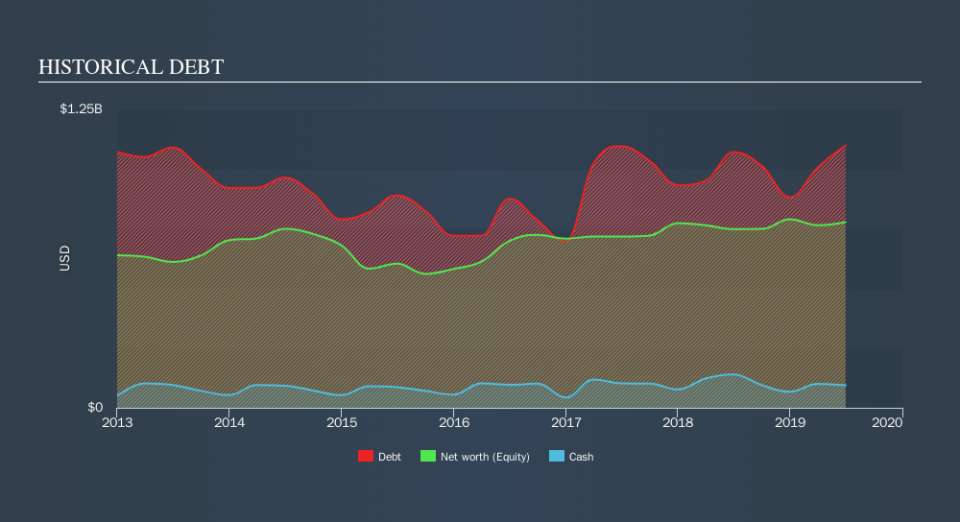ACCO Brands (NYSE:ACCO) Has A Somewhat Strained Balance Sheet

Warren Buffett famously said, 'Volatility is far from synonymous with risk.' It's only natural to consider a company's balance sheet when you examine how risky it is, since debt is often involved when a business collapses. As with many other companies ACCO Brands Corporation (NYSE:ACCO) makes use of debt. But the real question is whether this debt is making the company risky.
Why Does Debt Bring Risk?
Debt is a tool to help businesses grow, but if a business is incapable of paying off its lenders, then it exists at their mercy. Ultimately, if the company can't fulfill its legal obligations to repay debt, shareholders could walk away with nothing. However, a more frequent (but still costly) occurrence is where a company must issue shares at bargain-basement prices, permanently diluting shareholders, just to shore up its balance sheet. Of course, debt can be an important tool in businesses, particularly capital heavy businesses. The first step when considering a company's debt levels is to consider its cash and debt together.
Check out our latest analysis for ACCO Brands
How Much Debt Does ACCO Brands Carry?
As you can see below, ACCO Brands had US$1.10b of debt, at June 2019, which is about the same the year before. You can click the chart for greater detail. On the flip side, it has US$94.1m in cash leading to net debt of about US$1.00b.
A Look At ACCO Brands's Liabilities
According to the last reported balance sheet, ACCO Brands had liabilities of US$500.6m due within 12 months, and liabilities of US$1.67b due beyond 12 months. Offsetting this, it had US$94.1m in cash and US$460.5m in receivables that were due within 12 months. So its liabilities total US$1.62b more than the combination of its cash and short-term receivables.
This deficit casts a shadow over the US$938.9m company, like a colossus towering over mere mortals. So we definitely think shareholders need to watch this one closely. After all, ACCO Brands would likely require a major re-capitalisation if it had to pay its creditors today.
We use two main ratios to inform us about debt levels relative to earnings. The first is net debt divided by earnings before interest, tax, depreciation, and amortization (EBITDA), while the second is how many times its earnings before interest and tax (EBIT) covers its interest expense (or its interest cover, for short). Thus we consider debt relative to earnings both with and without depreciation and amortization expenses.
ACCO Brands has a debt to EBITDA ratio of 3.6 and its EBIT covered its interest expense 5.5 times. Taken together this implies that, while we wouldn't want to see debt levels rise, we think it can handle its current leverage. Sadly, ACCO Brands's EBIT actually dropped 5.7% in the last year. If earnings continue on that decline then managing that debt will be difficult like delivering hot soup on a unicycle. There's no doubt that we learn most about debt from the balance sheet. But ultimately the future profitability of the business will decide if ACCO Brands can strengthen its balance sheet over time. So if you're focused on the future you can check out this free report showing analyst profit forecasts.
Finally, while the tax-man may adore accounting profits, lenders only accept cold hard cash. So we always check how much of that EBIT is translated into free cash flow. Over the most recent three years, ACCO Brands recorded free cash flow worth 55% of its EBIT, which is around normal, given free cash flow excludes interest and tax. This cold hard cash means it can reduce its debt when it wants to.
Our View
Mulling over ACCO Brands's attempt at staying on top of its total liabilities, we're certainly not enthusiastic. But at least it's pretty decent at converting EBIT to free cash flow; that's encouraging. We're quite clear that we consider ACCO Brands to be really rather risky, as a result of its balance sheet health. So we're almost as wary of this stock as a hungry kitten is about falling into its owner's fish pond: once bitten, twice shy, as they say. In light of our reservations about the company's balance sheet, it seems sensible to check if insiders have been selling shares recently.
If, after all that, you're more interested in a fast growing company with a rock-solid balance sheet, then check out our list of net cash growth stocks without delay.
We aim to bring you long-term focused research analysis driven by fundamental data. Note that our analysis may not factor in the latest price-sensitive company announcements or qualitative material.
If you spot an error that warrants correction, please contact the editor at editorial-team@simplywallst.com. This article by Simply Wall St is general in nature. It does not constitute a recommendation to buy or sell any stock, and does not take account of your objectives, or your financial situation. Simply Wall St has no position in the stocks mentioned. Thank you for reading.



